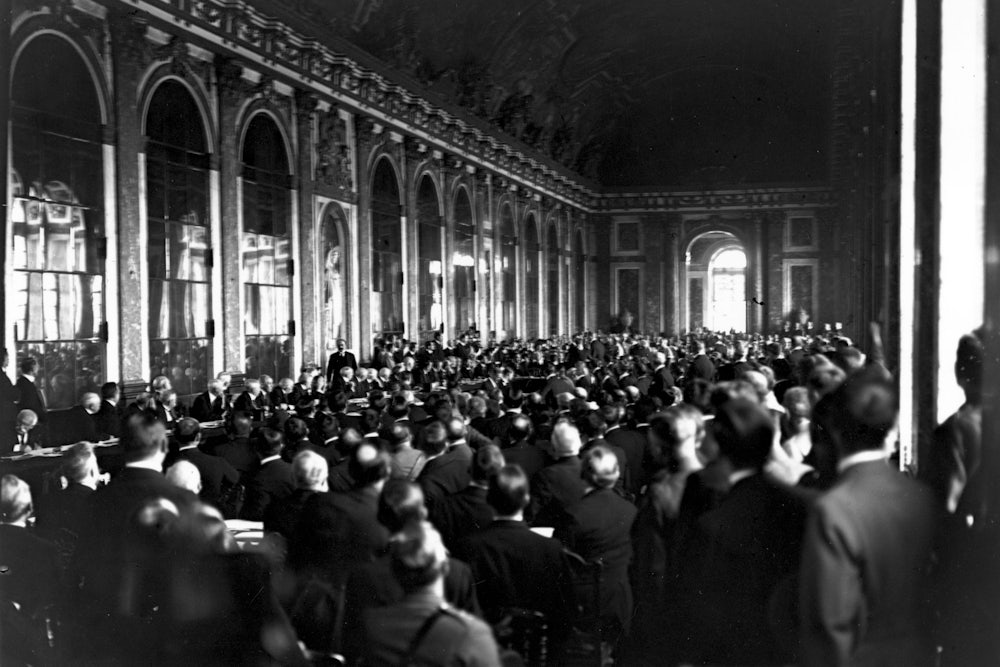Of all the issues raised by Germany’s National Socialist movement, its promise to scrap the Versailles Treaty has probably appealed more strongly to the Germans than any other. Its most captious critics will have to admit that it went about the business of solving this problem in an extraordinarily systematic manner. It avoided the mistakes of the Communist Reichstag group which in 1932 presented an unrealistic resolution repudiating the Versailles agreement. The adoption of such a declaration at that time would at once have forced the former Allies to resort to disastrous sanctions. The National Socialists pursued the more rational method of hollowing out the Treaty until it altogether ceased to be a factor in German politics.
The first step in this direction was the repudiation of the government’s financial obligations under the peace agreement. In this field Brüning had already prepared the ground. His last debt agreement in Geneva, conceded by the Allies because they wished to fortify the Liberal-Centrist government against the rising Hitler storm, had practically done away with reparations payments although Germany officially remained the debtor of its former enemies for a relatively small amount.
Having thus got rid of her obligations to the victor states, Germany proceeded, by a series of carefully calculated maneuvers, to decrease her private debt. That was not quite so easy. It was one thing to repudiate reparations payments forced upon a bankrupt nation, another to withdraw from private obligations, voluntarily incurred, without undermining the credit of the nation in the world market. But the Nazi government rose to the occasion with the recent ingenious announcement by Reichsbank President Schacht that Germany looks upon her long-term foreign debts as being commercialized political obligations which she is under no moral compulsion to pay.
Nothing could be further from the truth. These loans were made to Germany by creditors in other countries who, with the fullest confidence in her financial integrity and her ability to restore her industries, had backed them up with important economic and political concessions to furnish a healthy foundation for her economic reconstruction so as to safeguard their own investments. They were the basis, for instance, of the removal of the Allied armies of occupation. Mr. Schacht was, of course, not unconscious of the fact that his sophistry must rob Germany of the confidence of the outside world. He admitted as much to the members of the American Chamber of Commerce in Berlin when he assured them that
“Germany will not sacrifice its credit by its failure to pay these debts. He who does his job and does it well can always regain the credit he may have lost. One might, in this connection, refer to the fact that a number of South and Central American states are still looked upon as solvent although they have undergone not one but several national bankruptcies.”
But in thus ridding herself of a large part of her indebtedness, the Reich denounces only a part of her post-war covenant. Not less irksome than the concrete burden of foreign indebtedness was the domination of the Powers over Germany’s affairs abroad and at home. With her withdrawal from the League of Nations last October the Reich served notice on the world that she would no longer be bound by the League’s restrictions. The effect of the declaration was electric. The Powers were surprised and horrified. The fear of a new war loomed so dark on Europe’s horizon that Germany let matters rest for the time being. But her statesmen withdrew from the arena with the very satisfying conviction that her bold decision had given the nations of Europe a bad case of nerves, that Germany, far from being at the mercy of powerful neighbors, was looked upon with fear and misgiving. They drew the obvious conclusion. Up to that time the Reich had armed in secret and with circumspection. Now she flaunts her military preparations in the face of all comers. The Reich budget for 1934-35 provides for an increased expenditure of 607,000,000 marks for military purposes, 175,000,000 for the army, 50,000,000 for the navy, 132,000,000 for the creation of an air fleet and 250,000,000 for the “brown army,” the Storm Divisions. That a budget of such dimensions must, in these circumstances, necessarily excite unfavorable comment is manifest.
The British Foreign Office, which during the past year has been Germany’s most inveterate supporter, requested an explanation. The answer was more illuminating than polite. Germany, von Neurath declared, is bound to no budgetary limitations under the terms of the Versailles Treaty. There is a certain justification for this stand. But Germany deliberately ignores the incontestable fact that this does not apply to disbursements that contravene the provisions of the Versailles covenant. This is the case, however, when the German government makes costly appropriations for a reorganization of the Reichswehr on a basis of short-term military service, ignoring the fact that such reorganization can take place only with the consent of the signatories. This is the case, again, when huge appropriations are made for the building of an “aerial force for national defense,” the very existence of which is forbidden by the terms of Versailles. In this connection a statement made by the German Air Minister, General Goring, to Sir Anthony Eden, when the latter ventured an inquiry as to Germany’s armament intentions, is enlightening. “Germany,” was the answer, “intends to have an air force second to none.” With these words the spokesman of the German Cabinet served notice that the Treaty of Versailles was about to be thrown, another scrap of paper, at the feet of the Allied nations.
What now? The next move must be made by Germany’s debtors, whose position is far from enviable. France is intensely occupied with her own internal affairs. Under more favorable circumstances, she would doubtless have rallied Belgium and the Little Entente and perhaps Great Britain and Italy as well, to decisive action. But things being as they are, with decision in the hands of London and Rome, the success of Germany’s offensive is practically assured.
Belief or disbelief by the Allies of Germany’s protestations of poverty will not greatly affect the final outcome. These cries of “wolf, wolf” have been the preliminary of every debt payment exacted from the Reich in the past. True, Germany is following the example set by Great Britain, France and most of the other Allied nations when she refuses to recognize her war-debt obligations. But no other European Power has as yet attempted to shake off its private loans.
The New Republic has always insisted that Germany would sooner or later be forced to repudiate her foreign obligations because she lacks the means to pay. Her trade balance has been on the downgrade for years. In the three months from October 1 to December 31, 1933, her gold and foreign exchange reserves decreased 7,000,000 marks; from January 1 to March 31, 1934, this decline increased to 140,000,000, with no prospect of improvement. The same calamitous downward tendency is apparent in Germany’s export trade. Since the first of the year, her trade balance has been for the most part unfavorable, her imports maintaining a growing advantage over her exports although it would have been possible to safeguard her dwindling foreign-exchange reserves by an import embargo.
Her offer to pay in kind has always been rigidly refused by her creditor nations. High tariffs, quotas, embargoes and the world boycott have added immeasurably to her difficulties. The importation of cotton and wool in quantities sufficient to take care of Germany’s industries for the next nine months in the face of this catastrophic drop in the Reichsbank’s reserves suggests that the president of this institution resorted to flagrant manipulations to prepare the ground for this crisis.
This is not the first time that Schacht has resorted to such doubtful methods. When, under Hitler, he became president of the Reichsbank a second time, he at once repaid a credit of 400, 000,000 to the International Bank at Basel, although the latter had made no such request. By thus halving the Reichsbank’s reserves, the German government was placed in a more favorable position toward its creditors. Schacht is again using the same maneuver to dispose once and for all of what remains of Germany’s huge indebtedness.
An immediate reduction of Germany’s foreign trade will be the result. Despite von Neurath’s rejection of the principle of autarky, she will be forced into an artificial state of self-sufficiency that will bring as the next step a regulation of commodity distribution like that of wartime. Once more the German masses will be forced to live a life of “Prussian frugality.” For the needs of the state—armaments by sea and by land and in the air—there will always be money enough.
What the final outcome of the present impasse will be, nobody today can foretell. The German people, schooled in trade-union and political organization and accustomed to a fairly high standard of living by years of relative prosperity, will not willingly accept for any length of time the lowered standard of an earlier era, a standard that the National Socialist rulers are trying to enforce for the furtherance of their own super-nationalist, imperialist aims. Sooner or later in the course of the next decade, the economic and political repressions of the Hitler regime will find an outlet in an explosion, at home or abroad, that may mark a turning point in European civilization.






